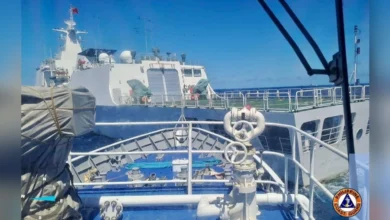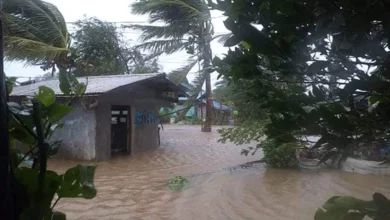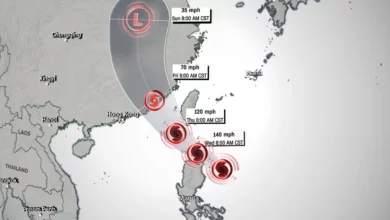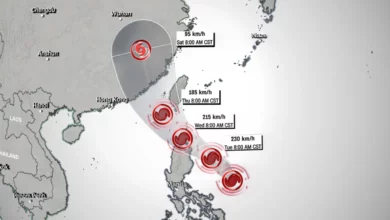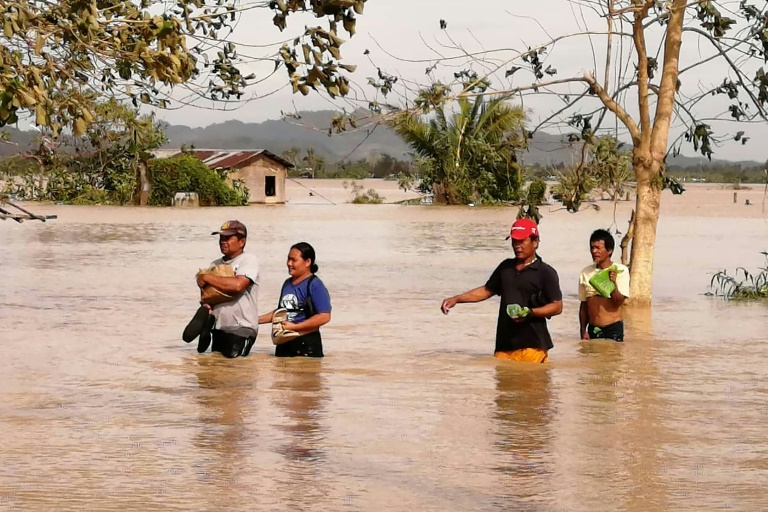
A typhoon that swept across remote villages and popular tourist areas of the central Philippines on Christmas day claimed at least 16 lives, authorities said on Thursday.
Typhoon Phanfone, with gusts reaching 200 kilometers (125 miles) an hour, tore roofs off houses and toppled electric posts as it ripped through the central Philippines on Wednesday.
Videos from the typhoon’s path showed fallen trees and strong winds pummeling flimsy houses. Local disaster officials cut felled trees to clear blocked roads.
At least 16 people were killed in villages and towns in the Visayas, the central third of the Philippines, according to disaster agency officials.
Phanfone also hit Boracay, Coron and other holiday destinations that are famed for their white-sand beaches and popular with foreign tourists.
Mobile phone and internet access on Boracay was cut during the storm and the networks remained down on Thursday, making assessment of the damage there difficult.
“Still, communication lines are down. Electricity is still down,” Jonathan Pablito, police chief of Malay town in Alkan province, which is on an island neighbouring Boracay, told AFP.
Pablito said ferry services between Boracay and Aklan — the main way to travel to and from the holiday island — were still not operating on Thursday, even though the storm had passed.
“We have no news from coast guard if ships were allowed to sail. Since the 24th… all those going to the island and coming from the island weren’t able to cross.”
The airport at Kalibo town in Aklan, which services Boracay, was badly damaged, according to a Korean tourist who was stranded there and provided images to AFP.
“Roads remain blocked, but some efforts have been made to clear away the damage. It’s pretty bad,” Jung Byung-joon said via Instagram messenger.
“Everything within 100 meters of the airport looks broken. There are a lot of frustrated people at the airport as flights have been cancelled.
“Taxis are still running but it’s windy and still raining so no one wants to leave the airport, including me.”
Another Korean tourist stuck at the damaged airport said she had been unable to make contact with her friend on Borocay on Thursday.
“I tried to call my friend in Boracay today and wasn’t able to get through. Maybe something isn’t working,” Dahae Gong told AFP via Instagram.
“I don’t know when I will be able to go home.”
Memories of monster storm
Still, there was no indication of any major damage or otherwise on Boracay.
Though much weaker, Phanfone tracked a similar path as Super Typhoon Haiyan — the country’s deadliest storm on record which left more than 7,300 people dead or missing in 2013.
“It’s like the younger sibling of Haiyan. It’s less destructive, but it followed a similar path,” Cindy Ferrer, an information officer at the Western Visayas region’s disaster bureau, told AFP.
In San Jose town in Occidental Mindoro, a video uploaded by the local government showed overturned fishing vessels and ruined shanties on the coast due to the storm.
Tens of thousands of people in the mostly Catholic nation were forced to evacuate their homes on Wednesday, ruining Christmas celebrations.
Many others were not able to return to their families, with ferries and plane services suspended.
Among those killed was a police officer electrocuted by a toppled post while patrolling.
The Philippines is the first major landmass facing the Pacific typhoon belt, and is hit by an average of about 20 major storms a year.
Many of the storms are deadly, and they typically wipe out harvests, homes and infrastructure, keeping millions of people perennially poor.
Reporting by AFP
Image: Residents wade through a highway flooded by typhoon Phanfone in Ormoc City, Leyte province (AFP / RONALD FRANK DEJON)

